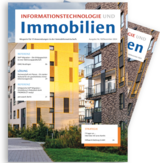Predictive analytics in the property industry – predicting the future with AI
What is predictive analytics?
Have you ever wondered how tangible insights are gained from a seemingly endless stream of data? Predictive analytics is exactly this magic – or rather, precise science. The term refers to the art of using historical data and patterns to make predictions for the future. Statistical models, machine learning and artificial intelligence are used for this. They analyse past events, identify correlations and provide forecasts that help real estate companies identify and respond to any challenges at an early stage. In short: predictive analytics transforms data into valuable future forecasts.
In which fields can predictive analytics be used?
The possible applications of predictive analytics are extremely diverse. From the preventive maintenance of technical systems and the prediction of rental price trends to the optimisation of space utilisation – the fields of application are almost limitless. Property companies could identify potential problems in building technology before they even arise, or manage the energy consumption of an entire neighbourhood in advance. Predictive analytics can also provide valuable services in marketing by helping companies better understand customer needs and respond to them in a targeted manner. So there’s really hardly any field that could not benefit from predictive data analyses.
What application examples are already out there?
That all sounds very promising, but what does it look like in practice? A good example is the maintenance of buildings: with the help of sensor data, potential faults or failures in lifts or heating systems can be detected at an early stage and maintenance can be planned in good time. Another exciting example is the rental price analysis. By analysing market and economic data, future rental price movements can be predicted, which helps owners and managers plan strategically. And then there’s the subject of energy efficiency: predictive analytics can forecast the energy consumption of buildings and identify potential for optimisation before unnecessary costs are incurred.

Figure 1: Predictive analytics can be used in a variety of ways, from risk management and market value forecasting to project development and location analyses.
How will predictive analytics change the property sector in the long term?
Predictive analytics is not just a tool to improve short-term decisions – it’s a real game changer for the property industry. In the future, buildings could operate almost autonomously, monitoring and optimising themselves. Property portfolios could be managed so precisely that vacancies and inefficient use of space become a thing of the past. By identifying trends and risks at an early stage, predictive analytics can help property managers make long-term strategic decisions that maximise the value of properties and minimise operating costs. So it’s not just about the next step, but about a completely new way of thinking about the property sector.
Are there also challenges?
Like any new technology, predictive analytics also brings challenges. One of the biggest hurdles is the quality and availability of the data – without a reliable database, even the best algorithms are powerless. The implementation of predictive analytics in existing systems often requires considerable investment in technology and expertise. Data protection and data security are also important topics, as sensitive information must be processed and protected. Last but not least, there is the question of acceptance: how easy is it to convince employees and customers of the benefits of this technology? These challenges must all be mastered in order to realise the full potential.
Data quality as the basis for future-oriented technologies
PROMOS has been supporting customers on their journey into the digital future for many years. A key challenge for the successful use of predictive analytics is the quality and availability of the data. This is where we come in with our solutions: our ERP systems create a stable and centralised database, which is essential for well-founded analyses. To complement this, we also provide mobile solutions for data maintenance, which ensure that data is updated in real time and remains consistent.
Conclusion
Predictive analytics offers exciting possibilities, from preventive maintenance to accurate rental price forecasts. The technology promises not only more efficient management and better decisions, but also a deeper insight into future developments. Nevertheless, implementation and integration involve challenges, such as the quality of the data and the necessary investment in technology and expertise. We see these challenges as an opportunity to pave the way for future technologies through continuous innovation and digital solutions, such as our digitalised invoice. As we prepare for the next steps in the digital transformation, we always remain prepared to explore new developments and opportunities in the industry. We look forward to reaching the next milestones together with our customers!
redaktion@openpromos.de


